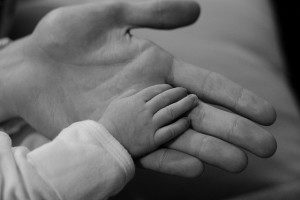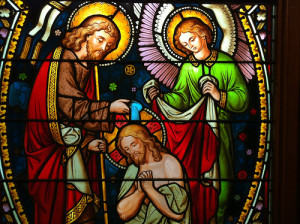Guest speaker Rev. Ron Thomas
I came across three different sources that state there are between 200 – 300 questions Jesus asked as revealed in the Scriptures. Some may be repeated, but still, the number is impressive. They are at times probing, searching, convicting, revealing, enlightening, inviting and assuring. As many of the Lord’s questions were directed to those who called out to him or chose to follow him, or more specifically his disciples, I believe they are worth asking again and for us to respond if Jesus were asking us some of those same questions.
The question Jesus asked of two men who called out to him from their world of despair and darkness is the focus of our study.
Matthew 20:29-34
29And as they went out of Jericho, a great crowd followed him. 30And behold, there were two blind men sitting by the roadside, and when they heard that Jesus was passing by, they cried out, “Lord, have mercy on us, Son of David!” 31The crowd rebuked them, telling them to be silent, but they cried out all the more, “Lord, have mercy on us, Son of David!” 32And stopping, Jesus called them and said, “What do you want me to do for you?” 33They said to him, “Lord, let our eyes be opened.” 34And Jesus in pity touched their eyes, and immediately they recovered their sight and followed him.
This event in the life of Jesus occurs about fifteen miles outside of Jerusalem, only a couple of days before he enters the city where he would be arrested, tried, crucified and buried. The pilgrimage had begun, as every male Jew over the age of twelve was required by the law to attend Passover. One of the main roads traveled to Jerusalem ran through the center of Jericho. William Barclay describes in his commentary the scene.
“It was clearly impossible that such a law should be fulfilled and that everyone should go. Those who were unable to go were in the habit of lining the streets of towns and villages through which groups of Passover pilgrims must pass to bid them godspeed on their way. So then the streets of Jericho would be lined with people… Jericho was also the home many of priests and Levites, living there awaiting their rotation to serve in the Temple in Jerusalem. Very many of these priests and Levites resided in Jericho when they were not on actual temple duty.”
According to our text, Jesus had attracted a crowd. Remember he has been recognized by the masses as one who taught with authority. Again, Barclay writes:
“When a distinguished Rabbi or teacher was on such a journey it was the custom that he was surrounded by a crowd of people, disciples and learners, who listened to him as he discoursed while he walked. That was one of the commonest ways of teaching.”
Two blind men were siting at the side of the road where they would be begging for their very livelihood, and what an opportune time with so many people traveling through their home town! Possibly through the conversation among those traveling with Jesus, or by their own curiosity, they learn that it is Jesus who is passing by. It is then they shout out; “Lord, have mercy on us, Son of David!”
Immediately, they were rebuked by the crowd with Jesus telling them to be quiet. The desire to silence them could have been for different reasons.
- Those who were listening to the teachings of the traveling Rabbi would have certainly considered the shouts from anyone were distractions and making it difficult to hear the teacher.
- There would be those who considered the journey of paramount importance and to call a halt to the procession only delayed the anticipated arrival at the Holy City, Jerusalem.
- There were also those in the crowd, or along side the road who represented the priestly duties of the Temple, men who were not all that enamored with this popular, itinerant preacher. Their dislike for Jesus would have only been agitated by the titles of respect and reverence the two beggars proclaimed: “Lord and Son of David.” They needed to be silenced, so that others would not be encouraged to bestow any such titles upon Him.
How these men had learned the truth of whom Jesus is we can only guess. Their faith in Jesus must have come by hearing. In the Gospel of Matthew, there are four other accounts to Jesus healing the blind, prior to this encounter. Or, like Peter, great confession, could their proclamation have been the prompting or inward illumination by the Holy Spirit?
Regardless of the objections and rebukes, the men “cried out all the more, “Lord, have mercy on us, Son of David!” At this point, Jesus must have already passed by the two men, for we read that he stopped and then called to them. The parallel accounts in Mark and Luke show that there was the invitation by Jesus for the men to be brought to him. The question is then asked:
“What do you want me to do for you?”
If Jesus were to ask you this question, what would be your answer? Life’s circumstances will often determine what we would ask of Jesus. For these to men, it was the deep desire to be able to see. The confines of blindness deprived them not only of sight, but also a livelihood. Their existence was totally dependent upon the compassion of others. Their physical infirmity was their sentence to poverty, to a life lived outside the acceptance of others. They had good reason to call on the One they believed could free them from their hopeless station in life. Their plea was for something much greater that the ability to see. It was a request of the Lord to give them a new life.
Jesus, by his very question was probing deeply into the hearts of these men. They wanted more than just the coinage that might be deposited in their laps as the crowd walked by. They want much more than a handout for the day. They called out to Jesus, the Son of David, the One to set the captive free. They wanted to experience life like they had never experienced it before.
And Jesus in pity touched their eyes, and immediately they recovered their sight and followed him.
The elements of prayer are revealed in petition of the two blind beggars:
- They acknowledged the lordship of Jesus, the Son of David, savior of God’s people, the One who gives sight to the blind and sets the captive to free.
- It is with humility that they called out to Him; “Have mercy on us.”
- Even as they are put off by the crowd, they were not to be discouraged. William Barclay: It often happens that we are easily discouraged from seeking the presence of God. It is the man who will not be kept from Christ who in the end finds him. Pulpit Commentary: Faith resists opposition and triumphs over all impediments.
- Theirs was an imperfect faith, but they acted upon it. These two blind men had an imperfect faith but they were determined to act on the faith they had. It was as Son of David that they addressed Jesus. That meant that they did believe him to be the Messiah, but it also meant that they were thinking of Messiahship in terms of kingly and of earthly power. It was an imperfect faith but they acted on it; and Jesus accepted it.
- These two blind men were grateful. When they had received their sight, when they saw the very face of Jesus, they did not go away and forget; they followed Jesus. Hopefully, we don’t forget what Jesus has done for us and our prayers keep us close to him.
So, Jesus asks you, “What do you want me to do for you?” How are you going to respond?







